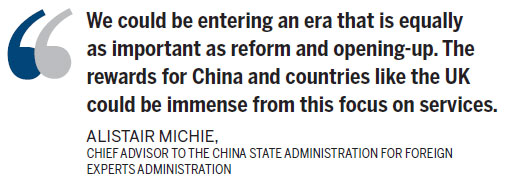UK firms have what China wants
Updated: 2015-01-30 08:38
By Andrew Moody(China Daily Europe)
|
|||||||||||
British companies well-suited to benefit from Chinese transformation
Leading business adviser Alistair Michie believes the UK is in danger of missing out on future opportunities in China.
As one of the most service-sector dominated economies, Britain should be poised to hugely benefit from the next phase in the development of the world's second-largest economy, he says.
|
Alistair Michie, chief adviser to the China State Administration for Foreign Experts Administration, believes there is a unique opportunity now for UK companies to take advantage of China's move into services. Feng Yongbin / China Daily |

But the 66-year-old Scot, who is chief adviser to the China State Administration for Foreign Experts Administration, warns this may not be the case.
"I don't think the UK is looking with a clear focus about what is happening here. They are not looking at the signals. I don't think they fully comprehend how UK businesses might benefit from the next stage of China's development."
Michie, an influential figure who mixes among the higher echelons of government, was speaking at the offices of strategic consultancy NICG, for which he is also business and government adviser, at Ocean International Center in Beijing.
He says he believes there is a unique opportunity now for UK companies to take advantage of China's move into services but that those engaging with China often tend to knock on the wrong doors.
"In the UK there is still a focus on opening up business relations through Chinese government ministries and state-owned enterprises. There is a lack of recognition that 60 percent of China's GDP now comes from the private sector and this is what is going to drive China's service-sector revolution."
He says visits such as by UK Prime Minister David Cameron in December 2013 - when he accompanied some 100 UK businesses to China - are useful but are not likely to change an often British "myopic" mindset about China.
"Anything that engages and creates dialogue and brings British people here to see for themselves is a plus. But my argument is that they are not actually seeing the clear reality of this immense opportunity."
Michie, who was the first British national to advise President Xi Jinping on aspects of the 18th Party Congress Report at the end of 2012, says the British - and particularly its media - do not pay close enough attention to documents such as that report.
"He said that this was my blueprint for the next 10 years. If you accept that the Chinese planning system works, since it has delivered 30 years of unprecedented growth, then it is surely sensible to pay attention to this. All the signals are there in the document that the aim is to make the economy more driven by domestic demand and based around a modern service industry."
He insists though that the opportunity for Britain is not about usurping Germany as China's leading trading partner in Europe.
"It is not about swapping or trading partners. Germany will continue to supply machine tools and high-end technologies. The reason why they have been successful over the past 30 years is that they have had what the Chinese want," he says.
"The UK, however, now needs to build the same relationship. The UK has strengths in financial services, healthcare and innovation and I sometimes feel the Chinese can see that clearer than we do ourselves. We are often not very good at seeing what we are good at."
Michie, who was educated at top Scottish public school Fettes College (as was former UK prime minister Tony Blair) says a diversion of "wine, women and song" resulted in his failing his university entry A Levels.
"I remember the conversation with my father after that. He told me, 'Oh well, my son. Here is the Daily Telegraph jobs column. My secretary over there will type up your CV'," he recalls.
He went to work for UK department retailer C&A Modes and had a succession of other jobs while studying at night school before eventually going to read economics at Strathclyde University five years later.
After graduating, he bested competition from 3,000 other applicants to work for the UK Liberal Party and, in particular, to be speechwriter of its then leader David Steel.
His experiences led to his writing a book on the Lib-Lab Pact, the loose informal coalition UK government of the late 1970s, with the late Guardian parliamentary sketchwriter and columnist Simon Hoggart.
Michie went on to work for the BBC as a producer and what then followed was a lifelong career in corporate and government communications.
It was working in this capacity as an adviser to Sir Malcolm Williamson, chief executive officer at Standard Chartered Bank, that he first came to China in the early 1990s.
"He allowed me to work here for six months and so I traveled north, south, east and west looking at ways to leverage the strengths of Standard Chartered."
He says he was hugely impressed by what he saw as the results of the first decade of Deng Xiaoping's reform and opening-up.
"I was astounded by all the energy and change taking place. At the time there was nothing written about this in the Western media. I was seeing the impact of 10 years of 10 percent annual growth. I was already hooked."
He resolved to stay and over the past more than two decades, he has held a number of positions, including being special consultant to Hanban, the body responsible for setting up Confucius Institutes around the world, honorary associate at the Needham Research Institute at Cambridge University as well as deputy chairman of The 48 Group Club, one of the oldest foreign business associations in China.
In 2013, he was the recipient of the Friendship Award, one the highest awards bestowed on foreigners by the Chinese government.
Michie believes the world does not fully understand that the Third Plenum in 2013 - setting out the Chinese government's policy for the next decade - could prove to be as transformational as that of the 1978 plenum, which provided the blueprint for reform and opening-up.
"You not only have this very clear emphasis on the service sector but also the signal that the market is going to play a significant role in China's development."
Michie says he likes to see China's version of state-directed capitalism as an "invisible hand" guiding markets, deploying the term used by his fellow Scot Adam Smith in his 1776 book, The Wealth of Nations.
"I don't think the Western media, with the possible exception of The Economist, actually pick up the signals of China's planning system. I think the media often portrays a negative image of China which inhibits analysis and actually prevents businesses seeing opportunities here. I think that is particularly the case in the UK."
He believes another real weakness is the lack of teaching about China and also Chinese language in British schools and universities.
"Teaching about Chinese history and culture is almost completely absent from UK schools. They still have the same emphasis on Europe and Germany and France, which mattered more 100 years ago than today.
"I think there are around 20,000 French teachers in UK schools but only about 300 to 400 licensed Mandarin ones. We have moved away from the situation a few years when Durham University even closed down its China department (its East Asian studies department closed in 2007 but a new China one has since opened) but there is still not enough emphasis on educating young people about China."
Michie believes that within the universities there is also a lack of emphasis on how a system like that of China - so different from that of the UK and other European countries - has delivered so much over the past 30 years.
"They really do fail to ask the question. I would love you to show me analysis from any university in the UK - or, in fact, anywhere in the world - that attempts to answer why a system like China has been so successful. I certainly haven't come across one.
"There is an unquestioning assumption in the UK and the United States that the only way to manage economies is the way they do it. There is little intellectual curiosity about China."
For Michie all this hampers efforts to build business in China, particularly in the services sector.
"We could be entering an era that is equally as important as reform and opening-up. The rewards for China and countries like the UK could be immense from this focus on services."
andrewmoody@chinadaily.com.cn
( China Daily European Weekly 01/30/2015 page8)
Today's Top News
China's port project in Greece not affected
Royal Mail Chairman Brydon to step down
Trial finds GSK Ebola shot safe, with immune response
Russian Delegation stripped of voting rights at PACE
China and Greece 'willing to continue cooperation'
China hails German leaders' call to remember history
Greece's new govt halts port sale to China
Putin sets government main task of ensuring social stability
Hot Topics
Lunar probe , China growth forecasts, Emission rules get tougher, China seen through 'colored lens', International board,
Editor's Picks

|

|

|

|

|

|






